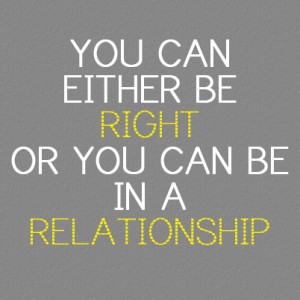How to effectively deal with conflict in your relationship
There are a number of things you can do to avoid setting yourself up for a win-lose dynamic and communication problems in your relationship.Consider these points when discussing important issues (in sequential order):
- Time & Place. Raise the issue at an appropriate time that works for both of you.
- One Thing a Time. Only raise one issue at a time and stay on track with that issue not allowing any other issues to clutter your argument.
- LISTEN & Repeat. Before you respond, let you partner know what you have heard and check that your understanding is correct. Once you have fully understood what your partner is saying, validate his/her perspective by letting them know what makes sense to you.
- EXPLORE. Ask open-ended questions to allow your partner to go deeper into their side of the issue e.g. ‘what’, ‘how’ and ‘when’ questions are good, but avoid ‘why’ questions if possible
- Express Empathy. Express empathy towards his/her perspective to build more connection e.g. “I imagine you feel…[insert feeling]…is that how you feel?”
Can you see where the challenges are in this process?
Most couples have trouble suspending their responses while listening, reflecting, asking questions, validating and being empathic. This is the part where your need to be right trumps the validity of what your partner is sharing. You then discount and dismiss their perspective because you are so fixated on making sure that your truth is the one that is superior.
Why curiosity is the ‘secret sauce’ for loving relationships
The biggest tool you can use in resolving conflict effectively is curiosity. And this is no easy task for most couples.
Being curious about what your partner is saying when every cell in your body wants to defend yourself is one of the most challenging tasks that all couples need to develop in order to become effective at resolving conflict. And not developing it can lead to relationship ruin.
You see, what curiosity does is:
- shows your partner you care about their thoughts and feelings
- gives you more data about the issue to increase your understanding
- helps you suspend your own reactivity and defensiveness
- de-escalates volatile discussions that are fuelled by fast-moving reactivity
You’re both right and you’re both wrong
The truth in the discussion of any issue is that you’re both right and you’re both wrong.
What I mean by this is there are always two different realities that are both true at any given time. Each of you perceives the issue from your own perspective and that viewpoint is your own reality that is true for you.
We could also say that you’re both wrong as well. Neither of you could ever appreciate every single part and nuance of the issue that your partner is sharing. None of us have omnipresent powers, so any perspective is limited by what we can see, hear and feel with our senses.
Bringing a humble attitude to the discussion of your issues can have wonderful benefits for you both. When you can truly be humble about how little you actually know, you realize that you don’t need to be right. And of course, there’s no such thing as a right and wrong when you truly appreciate the complexity of human relationships.
Next time you’re getting ready for discussing an important issue, we invite you to be humble and bring your curiosity to the conversation. Then watch what happens. You might be surprised by the results.

